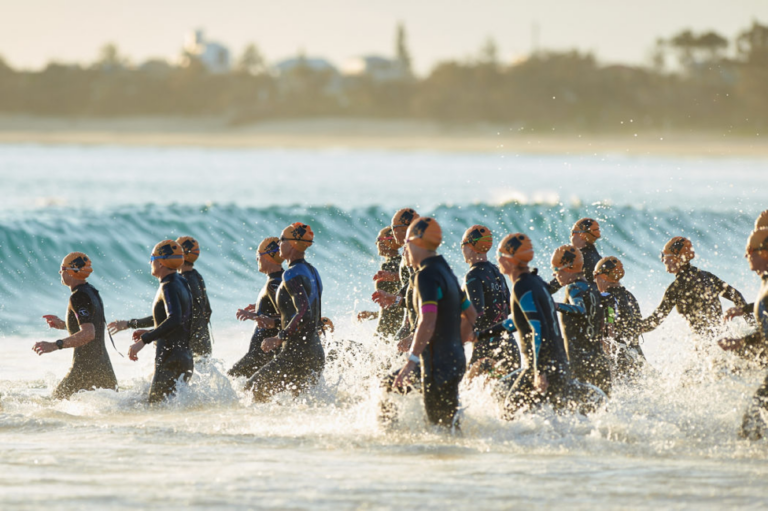An event combining mental toughness and physical endurance, the Hervey Bay triathlon provides a unique chance to surpass one’s boundaries. Instead of being just a test of power or speed, it is a complex symphony of strategy, dedication, and preparation. Known for its beautiful but difficult track, the triathlon demands athletes to run long distances, ride difficult bicycle routes, and negotiate open waters—all of which call for unmatched preparation. The first step in conquering the challenges of an undertaking is realising its scope.
The Hervey Bay triathlon’s complexity of obstacles makes it so magnificent. A comprehensive approach to training is essential for competitors since every race segment requires a different set of skills. It takes more than just physical skill to succeed in this sport; mental toughness and the capacity to adjust to constantly shifting circumstances are also essential. The travel to the finish line thus starts far in advance of the race day.
Building Strength and Stamina to Develop Physical Endurance
Any triathlon’s core is the mutually beneficial interaction between strength and endurance. In order to effectively prepare for the Hervey Bay triathlon, participants need to start a rigors training programme that aims to improve their muscular endurance and cardiovascular fitness. Running, cycling, and swimming all need specialised tactics to meet the competition’s many demands in a fair and balanced manner.
Long-duration, moderately intense sessions are the hallmark of endurance training, which establishes the foundation for long-term performance. Strength training, which includes core stabilisation exercises and resistance training, also increases the body’s resistance to injury and exhaustion. Participants may develop the physical skills necessary to meet the demanding requirements of the triathlon by combining these components into a planned regimen.
Beyond the specifics of physical preparation, however, knowledge of the function diet plays in recuperation and energy maintenance is essential. The body stays fueled throughout the demanding training time if a diet rich in complex carbs, lean proteins, and vital fats is consumed. Therefore, discipline and dedication are equally important in the physical aspect of preparation.
The Significance of Rest and Recovery in Training Cycles
It is easy to get fixated on gruelling training sessions in the quest for perfection. But ignoring recuperation may result in injury and burnout, which can throw even the best-laid plans into a loop. Incorporating scheduled rest intervals into the training regimen is not only recommended, but crucial for those training for the Hervey Bay triathlon.
Active techniques like stretching, foam rolling, and low-intensity exercises that support muscle restoration are all part of recovery, which goes beyond simple passive rest. Prioritising sleep also guarantees that the body and mind are refreshed and prepared to face future difficulties. In order to modify their training plan appropriately, athletes must also be alert for symptoms of overtraining, such as chronic tiredness or diminished performance.
Moreover, using recovery aids like massage or cryotherapy may speed up the healing process and improve performance in general. By considering recuperation as a crucial aspect of training, athletes may maximise their preparedness for the race.
Developing a Tailored Approach to Race Day Achievement
The creation of a thorough race-day plan is the last step in the Hervey Bay triathlon preparation process. This entails not only mental and logistical preparation but also physical preparedness. It is imperative that athletes get acquainted with the event schedule and make sure that all equipment, including energy gels and wetsuits, is present and easily available.
The pacing strategy is equally crucial as it determines the distribution of energy reserves during the swim, bike, and run. One may avoid early weariness and achieve a good finish by keeping a steady pace, especially in the beginning. Plans for nutrition and hydration must also be carefully considered, because not eating enough during the marathon may seriously affect performance.
Lastly, it’s important to embrace flexibility since even the most careful plans may be derailed by unanticipated events like weather shifts or equipment failures. Athletes may overcome such obstacles with poise and resolve by developing adaptation, preventing uncertainty from undoing their hard work.
Creating a Network of Support from Friends, Family, and Competitors
Although triathlon training is a very personal endeavour, it is often enhanced by the assistance of a committed network. The support of friends and family may give priceless emotional support, while the companionship of other competitors provides fresh perspectives and mutual inspiration. Talking to those who have been on the trip before may greatly improve the experience.
Joining neighbourhood triathlon clubs or training groups offers chances to share tactics, learn from one another, and form enduring relationships. These groups provide a feeling of community, which lessens the loneliness that sometimes accompanies practicing alone. A supporting network’s combined excitement turns into a potent source of motivation as race day draws near.
Overcoming Obstacles: Adaptability in the Face of Misfortune
There are difficulties in any training process, and the Hervey Bay triathlon preparation is no different. An athlete’s determination may be put to the test when injuries, exhaustion, or unforeseen life circumstances momentarily halt development. Disadvantages, however, do not always indicate failure; rather, they provide chances to develop adaptation and resilience.
A key component of conquering challenges is learning to pay attention to one’s body and realising how important rest is throughout the healing process. It shows adaptability and a dedication to long-term success in modifying training schedules to account for unanticipated events. In the end, having the mental toughness to overcome obstacles with a positive outlook gives competitors the willpower to approach the race itself with fresh vigour.
Conclusion:
Successfully finishing the Hervey Bay triathlon is a feat that goes beyond just physical effort. It is what months of hard work, self-control, and development have culminated in. Reflecting on their path and acknowledging both their successes and the lessons they have learnt is encouraged.
The race acts as a demonstration of the value of tenacity and the benefits of pushing oneself. Many people have a better understanding for the potential of the human body and soul as well as a desire for endurance sports as a result of the experience. Through valuing the experiences and knowledge acquired from the triathlon, runners may maintain a feeling of accomplishment that goes beyond crossing the finish line.

